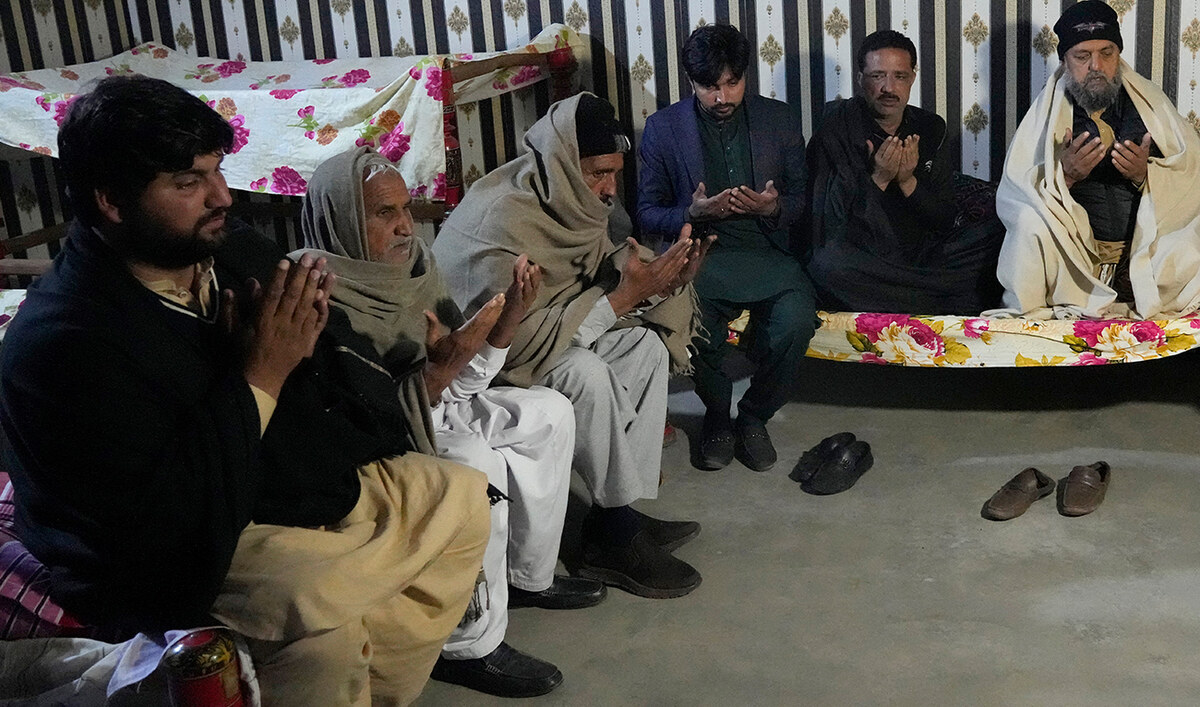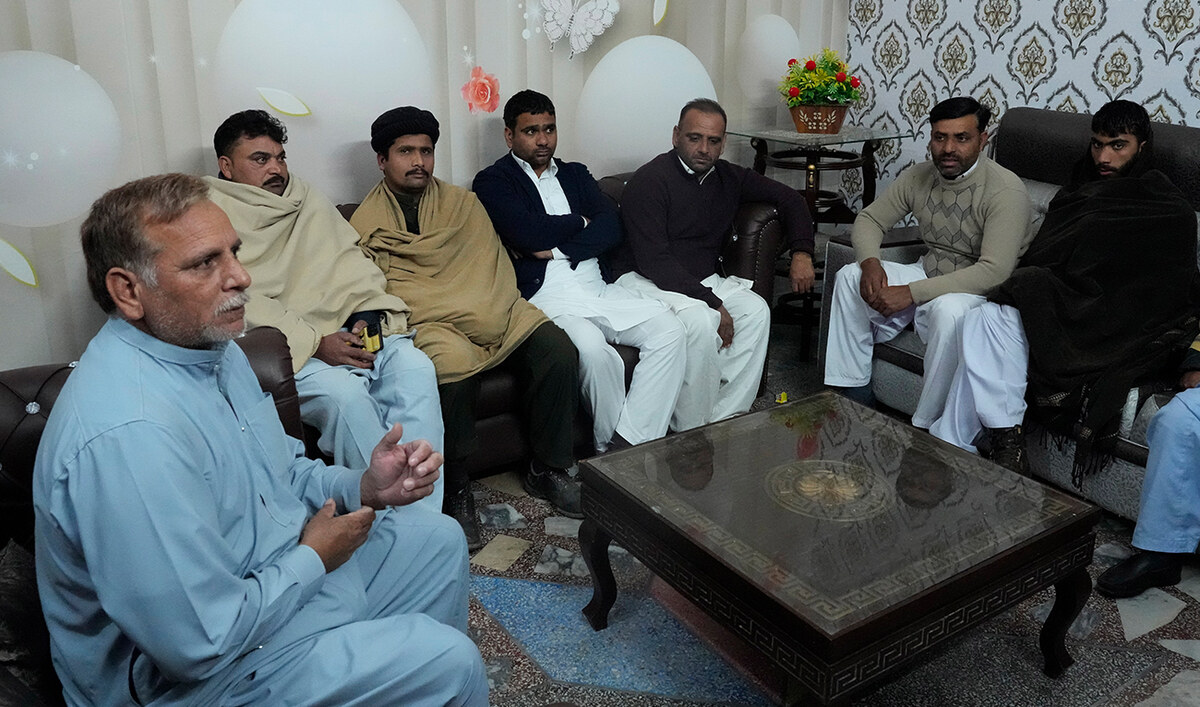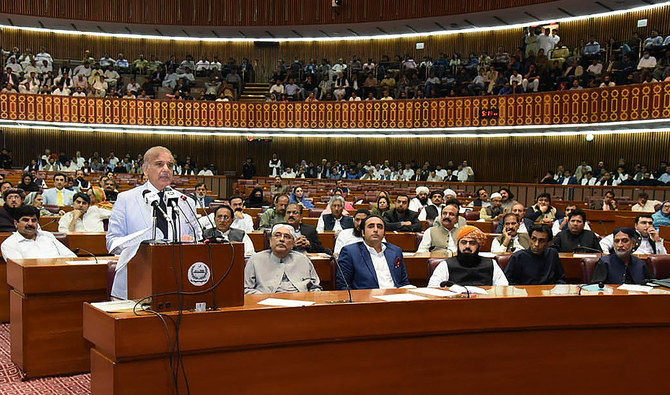ISLAMABAD: The ruling Pakistan Muslim League-Nawaz (PML-N) party said on Wednesday it was ready to welcome the return of former prime minister Imran Khan’s political faction to the National Assembly while ruling out the possibility of snap national elections.
Khan’s Pakistan Tehreek-e-Insaf (PTI) party decided to constitute a committee to discuss the options of returning to the lower house of parliament from which it resigned last April while trying to mount pressure on Prime Minister Shehbaz Sharif’s coalition administration to call early general elections.
The development came after the PTI dissolved the assemblies of Punjab and Khyber Pakhtunkhwa provinces this week where it was in power while deciding to return to the National Assembly to appoint its own leader of the opposition to participate in the deliberations related to the appointment of the next caretaker administration in the country.
“We are ready to welcome the PTI back in parliament, but there is zero chance of early national elections,” Saad Waseem, PML-N’s secretary parliamentary affairs, told Arab News.
Last year, speaker National Assembly Raja Pervez Ashraf appointed a PTI dissident Raja Riaz as the opposition leader in the house after Khan’s party resigned. Riaz enjoys the support of about 16 other PTI dissident members.
“Once the PTI returns to the National Assembly, we will see if they have the numbers to get their opposition leader appointed,” Waseem continued. “The democratic process will be followed, and the decision will be made as per the rules and procedures of the assembly.”
The parliamentary secretary said the provincial elections will be held in Punjab and Khyber Pakhtunkhwa provinces after the dissolution of their assemblies as per the constitution, adding the federal government would continue to stay in power until it finishes its term in August.
Khan was ousted from power in a parliamentary vote of no-confidence last April and has since been mounting pressure on the federal authorities to call early national elections.
In a setback to PTI’s plan of return to the national legislature, the speaker on Tuesday accepted 35 more resignations of the party, including one of Sheikh Rashid Ahmed, to thwart the move. In July, the speaker accepted 11 resignations of PTI members while elections were held on nine seats and Khan returned as winner on seven.
As per the National Assembly tally, the PTI still enjoys the support of about 80 lawmakers and can get its own leader of the opposition appointed.
“We are preparing to go back to the National Assembly to bring our opposition leader, so that a proper consultative process for the installation of the caretaker government can begin at the center,” Farrukh Habib, PTI’s central secretary information, told Arab News.
He said it was mandatory for the prime minister to consult the opposition leader before installing the caretaker prime minister as per the constitution, adding this was the reason why the PTI wanted “to remove the dummy opposition leader” in the house.
Habib said Khan, who is also the PTI chairman, had constituted a committee to discuss all available options to become part of the assembly, “and we will soon be making a final decision on it.”
The constitution says the president will appoint the caretaker prime minister in consultation with the prime minister and the leader of opposition in the outgoing National Assembly.
“The PTI will not participate in any formal proceeding of the assembly to validate the government but play its constitutional role for the early national elections,” he added.
PM Sharif’s party ready to ‘welcome’ PTI in parliament, rules out snap elections in Pakistan
https://arab.news/rtjrd
PM Sharif’s party ready to ‘welcome’ PTI in parliament, rules out snap elections in Pakistan

- PTI resigned from the National Assembly last April after former prime minister Imran Khan was ousted from power
- Khan’s party wants to bring its own leader of the opposition to participate in the process of appointing caretakers
Pakistan parliament passes controversial bill to amend cybercrime law

- Bill proposes Social Media Protection and Regulatory Authority to block illegal online content
- Disinformation will be punishable by three years in prison and fine of $7,150 under new law
ISLAMABAD: Pakistan's National Assembly on Thursday passed a bill to amend the country’s cybercrime law amid a walkout by opposition parties and journalists who fear the new legislation will be used to censor social media platforms.
Pakistan adopted the much-criticized Pakistan Electronic Crimes Act (PECA) in 2016, granting sweeping powers to regulators to block private information they deemed illegal. The law provided for up to seven years in prison for “recruiting, funding and planning of terrorism” online. It also allowed “authorized officers” to require anyone to unlock any computer, mobile phone or other device during an investigation.
The government said at the time restrictions under the new law were needed to ensure security against growing threats, such as terrorism, and to crackdown on unauthorized access, electronic fraud and online harassment. However, journalists and rights activists complain that the law has been largely used to go after journalists, bloggers and other people critical of the government and state institutions like the military.
The new amendment bill now proposes the establishment of the Social Media Protection and Regulatory Authority to perform a range of functions related to social media, including awareness, training, regulation, enlistment and blocking. SMPRA would be able to order the immediate blocking of unlawful content targeting judges, the armed forces, parliament or provincial assemblies or material which promotes and encourages terrorism and other forms of violence against the state or its institutions. The law also makes spreading disinformation a criminal offense punishable by three years in prison and a fine of two million rupees ($7,150).
“Whoever intentionally disseminates, publicly exhibits, or transmits any information through any information system, that he knows or has reason to believe to be false or fake and likely to cause or create a sense of fear, panic or disorder or unrest in general public or society shall be punished with imprisonment which may extend up to three years or with fine which may extend to Rs2m or with both,” a copy of the bill says.
The bill was presented in the National Assembly on Thursday by Federal Minister Rana Tanveer Hussain from the ruling Pakistan Muslim League-Nawaz party of premier Shehbaz Sharif.
“The bill will not harm but protect working journalists,” Information Minister Ataullah Tarar told reporters after the passage of the bill. “This is the first time the government has defined what social media is. There is already a system in place for print and electronic media and complaints can be registered against them.”
He said “working journalists” should not feel threatened by the bill, which had to be passed because the Federal Investigation Agency, previously responsible for handling cybercrime, “does not have the capacity to handle child pornography or AI deep fake cases.”
Tarar said the government was also aiming to bring social media journalists, including those operating YouTube accounts, under the tax framework.
The operative part of the new bill outlines that the Social Media Protection and Regulatory Authority would have the power to issue directions to a social media platform for the removal or blocking of online content if it was against the ideology of Pakistan, incited the public to violate the law or take the law in own hands with a view to coerce, intimidate or terrorize the public, individuals, groups, communities, government officials and institutions, incited the public to cause damage to governmental or private property or coerced or intimidated the public and thereby prevented them from carrying on their lawful trade and disrupted civic life.
The authority will also crackdown on anyone inciting hatred and contempt on a religious, sectarian or ethnic basis as well as against obscene or pornographic content and deep fakes.
Rights activists say the new bill is part of a widespread digital crackdown that includes a ban on X since February last year, restrictions on VPN use and the implementation of a national firewall. The government says the measures are not aimed at censorship.
Pakistan Navy takes over command of CTF-151 anti-piracy force at ceremony in Bahrain

- Task force set up in 2009 in response to piracy attacks in Gulf of Aden, off eastern coast of Somalia
- Pakistan has held command of CTF-151 a record 11 times followed by Turkiye which has led it 7 times
KARACHI: Pakistan Navy has taken over command for the eleventh time of the Combined Task Force-151 (CTF-151), a multinational body set up in 2009 as a response to piracy attacks in the Gulf of Aden and off the eastern coast of Somalia, the navy’s media wing said on Thursday.
CTF-151’s mission is to disrupt piracy and armed robbery at sea and engage with regional and other partners to build capacity and improve relevant capabilities in order to protect global maritime commerce and secure freedom of navigation. It operates in conjunction with the EU’s Operation Atalanta and NATO’s Operation Ocean Shield.
“Change of Command ceremony held at Combined Maritime Forces Headquarters, Bahrain,” the Pakistan navy said in a statement. “Commodore Sohail Ahmed Uzmi of Pakistan Navy appointed as new Commander of Combined Task Force-151.”
Earlier, the command was held by the Turkish Navy. Pakistan has held the command of the CTF-151 force a record 11 times followed by Turkiye, which has led it 7 times.
“Pakistan Navy will continue to work with navies of other countries for peace and stability in the region,” the statement quoted Uzmi as saying.
Command of CTF 151 is rotated between participating nations on a three-to-six-monthly basis. Countries that have led CTF 151 include Bahrain, Brazil, Denmark, Japan, Jordan, Kuwait, Pakistan, the Philippines, New Zealand, Republic of Korea, Singapore, Thailand, Türkiye, the UK, and the US. A variety of countries assign vessels, aircraft, and personnel to the task force.
Pakistan arrests suspected human smuggler behind Morocco migrant boat tragedy

- Boat capsized near Morocco’s coast on Jan. 15 while carrying 86 migrants including 66 Pakistanis
- Moroccan authorities have said 36 people were rescued, survivors include 22 Pakistanis
ISLAMABAD: Pakistan’s Federal Investigation Agency (FIA) said on Thursday it had arrested a human trafficker suspected of illegally sending Pakistanis to Spain on a migrant boat that capsized off the coast of Morocco last week.
The boat capsized near Morocco’s coast on Jan. 15 while carrying 86 migrants, including 66 Pakistanis, according to migrant rights group Walking Borders. Moroccan authorities said a day later 36 people were rescued from the vessel which left Mauritania on Jan. 2, while the Pakistani Foreign Office has said the survivors include 22 Pakistanis.
The tragedy has once again underscored the perilous journeys many migrants, including Pakistanis, embark on due to conflict and economic instability in their home countries.
“Human smuggler involved in Moroccan boat accident arrested,” the FIA said in a statement, identifying the suspect as Muhammad Aslam and saying he was arrested after a raid in the small town of Sambrial in Pakistan’s Punjab province.

The statement said Aslam and his accomplices had taken Rs5.35 million from the family of Aamir Ali, who died in the boat accident, and had tried to smuggle him to Spain via Mauritania.
“A case has been registered against the accused and an investigation has been launched. More arrests are expected after the accused are identified,” the FIA said.

A record 10,457 migrants, or 30 people a day, died trying to reach Spain in 2024, most while attempting to cross the Atlantic route from West African countries such as Mauritania and Senegal to the Canary islands, according to Walking Borders.
In 2023, hundreds of migrants, including 262 Pakistanis, drowned when an overcrowded vessel sank in international waters off the southwestern Greek town of Pylos, marking one of the deadliest boat disasters ever recorded in the Mediterranean Sea. More recently, five Pakistani nationals died in a shipwreck off the southern Greek island of Gavdos on Dec. 14.

The Pakistani government has ramped up efforts in recent months to combat human smugglers facilitating dangerous journeys for illegal immigrants to Europe, resulting in several arrests.
Prime Minister Shehbaz Sharif has also urged increased collaboration with international agencies like Interpol to ensure swift action against human trafficking networks.

Imran Khan calls off talks with Pakistan government over deadlock on judicial commissions

- First round of talks aimed at cooling political instability took place on Dec. 23 with two follow up sessions on Jan. 2 and 16
- At last round of talks, PTI gave government seven days to announce judicial commissions into May 2023 and Nov. 2024 protests
ISLAMABAD: Jailed former prime minister Imran Khan has called off negotiations with the government over its failure to establish judicial commissions to investigate violence at anti-government protests organized by his Pakistan Tehreek-e-Insaf (PTI), party chairman Gohar Khan said on Thursday.
Negotiations started last month with the aim of cooling political temperatures in the South Asian nation and three rounds have been held so far.
The PTI’s demands to the government revolve around the release of all political prisoners including Khan, and the formation of two judicial commissions to probe into violent protest rallies, including one on May 9 , 2023, when PTI supporters rampaged through military offices and installations, and a second one on Nov. 26, 2024 to demand Khan’s release, in which the government says four troops were killed. At the last meeting on Jan. 16, the PTI had given the government seven days to announce the truth commissions, a deadline that expired today, Thursday.
A Pakistani court last week sentenced Khan to 14 years in prison in a land corruption case, a setback to the nascent talks’ process.
“We [PTI] had given the government time of seven days [to form commissions],” Gohar told reporters outside the Adiala Jail in Rawalpindi where Khan has been incarcerated since 2023.
“Khan had made it clear that if the formation of the commissions is not announced during this time, then further rounds of talks will not continue … It is sad that the government did not announce anything till today. Hence Khan has called off the negotiations.”
Irfan Siddiqui, the spokesperson for the government’s negotiation committee, said on Wednesday the government would respond to the PTI party’s written demands on Jan. 28.
The talks opened last month as Khan had threatened a civil disobedience movement and amid growing concerns he could face trial by a military court for allegedly inciting attacks on sensitive security installations during the May 9 protests.
Khan’s first arrest in May 2023 in the land graft case in which he was sentenced last week sparked countrywide protests that saw his supporters attack and ransack military installations in an unprecedented backlash against Pakistan’s powerful army generals. Although Khan was released days later, he was rearrested in August that year after being convicted in a corruption case. He remains in prison and says all cases against him are politically motivated.
Protests demanding Khan’s release in November also turned violent, with the PTI saying 12 supporters were killed while the state said four troops had died.
Pakistan holds first training session for Hajj 2025 pilgrims

- Around 500 selected pilgrims from the Pakistani capital, suburban areas attended the training workshop
- The first phase of pilgrim training sessions will continue across the country till February 27, ministry says
ISLAMABAD: Pakistan’s religious affairs ministry has held its first training session in Islamabad for pilgrims selected for this year’s Hajj pilgrimage, it said on Thursday.
Around 500 selected pilgrims from the federal capital and its suburban areas attended the training workshop, who were briefed on administrative matters and Hajj rituals.
Hajj pilgrims are being provided training through audio-visual devices and other materials, according to the Pakistani religious affairs ministry.
“The first phase of training will continue across the country till February 27,” the ministry said. “The second phase of training will start after Ramadan.”
The development comes days after Pakistan began training of pilgrims, with the first session in the northwestern city of Peshawar.
Pakistan and Saudi Arabia this month signed the Hajj agreement 2025, under which 179,210 pilgrims from the South Asian country will perform the annual pilgrimage this year. The quota is divided equally between government and private schemes.
Pakistan’s latest Hajj policy has allowed pilgrims to make payments in installments for the first time. Under this scheme, the first installment of Rs200,000 ($717) had to be submitted with the application, the second installment of Rs400,000 ($1,435) within 10 days of balloting and the remaining amount by Feb. 10 this year.
The Pakistani religious affairs ministry has also launched the Pak Hajj 2025 mobile application, available for both Android and iPhone users, to guide pilgrims.
Additionally, the government has announced a reduction in airfare, lowering ticket prices for federal program pilgrims to Rs220,000 [$785.41], down from last year’s Rs234,000 [$835.39].
The Pakistan International Airlines, Saudi Airlines, and private carriers have agreed to transport pilgrims this year.
















